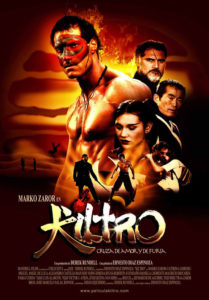Director: Ernesto Díaz Espinoza
Cast: Marko Zaror, Caterina Jadresic, Miguel Angel De Luca, Daniela Lhorente, Luis Alarcón, Alejandro Castillo, Man Soo Yoon, Roberto Avendano
Running Time: 93 min.
By Henry McKeand
At first glance, Marko Zaror is what you expect from an action star. A tall, intimidating martial artist from Chile with an intense screen presence, he was first introduced to most action fans as the villainous Dolor in the minor DTV classic Undisputed III. Zaror’s role as Dolor required him to ratchet up the scariness factor, as did later performances in films such as Machete Kills and Savage Dog, and it was immediately clear that he could have a career as a Hollywood heavy. Here was a man born to play the psycho and lose fights to more established names.
But there’s more to Zaror than meets the eye. That intense screen presence that made him an instant favorite in Undisputed III wasn’t just the result of a training regimen and unique bone structure—there’s a raw, vulnerable edge to his performances that lingers just under the surface. To this day, no American filmmakers have been able to harness Zaror’s leading man energy, but there’s one director from his native Chile who has always understood his star potential.
Ernesto Díaz Espinoza is a clear fan of bone-crunching genre cinema that pushes bodies to their limit. In Zaror, he found his muse—a rough yet magnetic actor capable of performing virtually any stunt a young screenwriter could dream of. But while Espinoza clearly relished at the opportunity to work with a physical performer of Zaror’s caliber, he wasn’t content simply creating a piece of mindless, macho spectacle. Instead, the films he ended up making with Zaror feel like martial arts fairy tales, as bold and fantastically imaginative as they are strange and tonally incoherent. There’s an unfiltered creativity in their collaborations, which find the two men combining their myriad influences, from spaghetti westerns to anime to superhero stories, and topping the concoction off with indie charm and David Bowie needle drops.
This uneven alchemy is on full display in Kiltro, the earliest collaboration between the two. Centering around a young, aimless man who studies martial arts to protect the girl he loves, the film has a sweet, almost adolescent appeal. Zaror’s character, Zami, comes across as a teenage boy living in the body of a dangerous man. His puppy dog simplicity and obsessive desire to protect the girl he loves make him seem like a more benevolent Travis Bickle, and he can only show his devotion through beating up every man who approaches her.
At one point, his friend advises him to open up and show the girl his sensitive side, saying that there’s more to him than empty gestures of violence. This doubles as a commentary on the film itself, which takes detours into comedy and romance as it develops Zami’s surprisingly earnest coming of age story. Instead of turning Zami into yet another tortured badass, Zaror and Espinoza are quick to highlight the absurdity of his hypermasculine posturing. In turn, the film grows goofier and more inventive as it introduces cartoonish villains, kitschy desert landscapes, and gonzo combat sequences.
Despite Zaror and Espinoza’s flair for action, those looking for fights on par with the Undisputed series will be disappointed. Nonstop action is forfeited in favor of quickly character development and extensive plotting. This made Kiltro a somewhat divisive film, and your mileage will vary depending on how much you enjoy Espinoza’s more left-field tendencies.
It’s hard not to at least appreciate Kiltro’s unique perspective, but there are times when the scattershot focus works to the film’s detriment. As this was his first feature length film, Espinoza isn’t always able to pull off the highwire act necessary to balance the film’s different moods and styles. The script especially lags in the second half, with far too much time dedicated to an overly serious villain backstory. And, because this is an action movie starring an accomplished martial artist, the film’s humor and critiques of pubescent aggression are ultimately pushed to the side to make room for violent catharsis and wish fulfillment.
Zaror, though, is great at delivering that catharsis, even if his climactic fight scenes are warmups for what he would go on to accomplish in Unidisputed III and subsequent Espinoza collaborations such as Mirageman. Espinoza’s visual flair is impressive even when the choreography itself is relatively pedestrian, and one particularly extreme sequence set in a packed alleyway feels like a glimpse of what a Takashi Miike/Scott Adkins collaboration would look like. Charmingly, there are frequent low-resolution cutaway shots of the more impressive fight beats, recalling a stunt sizzle reel shot on camcorder.
Zaror and Espinoza would go on to refine their style. Just three years later, Mirageman took Kiltro’s blueprint and ran with it, telling a more engaging narrative while further experimenting with genre conventions. Still, Kiltro is an engaging, if flawed, introduction to the world of Chilean martial arts filmmaking.
Zaror is slated to star in John Wick: Chapter 4, in which he will almost certainly play a villainous henchman. It’s a great gig, but true fans should be just as excited for El Puño del Cóndor, which will reunite him with Espinoza. Together, the two men will hopefully continue to develop their singular vision.
Henry McKeand’s Rating: 6.5/10




